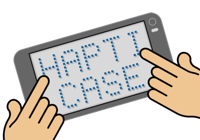HaptiCase: Back-of-Device Tactile Landmarks for Eyes-Free Absolute Indirect Touch

HaptiCase is an interaction technique for eyes-free absolute indirect touch based on back-of-device tactile landmarks and proprioception. It improves tapping accuracy significantly (14% target size reduction) without software modification.
Abstract
Using a smartphone for touch input to control apps and games mirrored to a distant screen is difficult, as the user cannot see where she is touching while looking at the distant display. We present HaptiCase, an interaction technique that provides back-of-device tactile landmarks that the user senses with her fingers to estimate the location of her finger in relation to the touchscreen. By pinching the thumb resting above the touchscreen to a finger at the back, the finger position is transferred to the front as the thumb touches the screen. In a study, we compared touch performance of different landmark layouts with a regular landmark-free mobile device. Using a landmark design of dots on a 3×5 grid significantly improves eyes-free tapping accuracy and allows targets to be as small as 17.5 mm—a 14% reduction in target size—to cover 99% of all touches. When users can look at the touchscreen, landmarks have no significant effect on performance. HaptiCase is low-cost, requires no electronics, and works with unmodified software.
Publications
- José Mínguez Garrigues. A Scalable Measurement Tool to Capture Back-of-Device Touch Data. Bachelor's Thesis, RWTH Aachen University, Aachen, September 2016.


- Ravi Kanth Kosuru. A Gestural Interaction Model to Classify Deformable Everyday Objects. Master's Thesis, RWTH Aachen University, Aachen, March 2016.


- Christian Corsten, Andreas Link, Thorsten Karrer and Jan Borchers. Understanding Back-to-front Pinching for Eyes-free Mobile Touch Input. In Proceedings of the 18th International Conference on Human-Computer Interaction with Mobile Devices and Services, MobileHCI '16, pages 185–189, ACM, New York, NY, USA, Sept 2016.


- Sebastian Hueber. Back-of-device Tactile Landmarks for Eyes-free Touch Input. Bachelor's Thesis, RWTH Aachen University, Aachen, September 2015.


- Andreas Link. Understanding Back-to-Front Pinching for Eyes-Free Mobile Touch Input. Bachelor's Thesis, RWTH Aachen University, Aachen, September 2015.


- Christian Corsten, Christian Cherek, Thorsten Karrer and Jan Borchers. HaptiCase: Back-of-Device Tactile Landmarks for Eyes-Free Absolute Indirect Touch. In CHI '15: Proceedings of the SIGCHI Conference on Human Factors in Computing Systems, pages 2171–2180,New York, NY, USA, April 2015.




- Christian Cherek. HaptiCase: Tactile Cues on the Back of Devices for Eyes-free Absolute Indirect Tapping Tasks. Master's Thesis, RWTH Aachen University, Aachen, November 2014.



